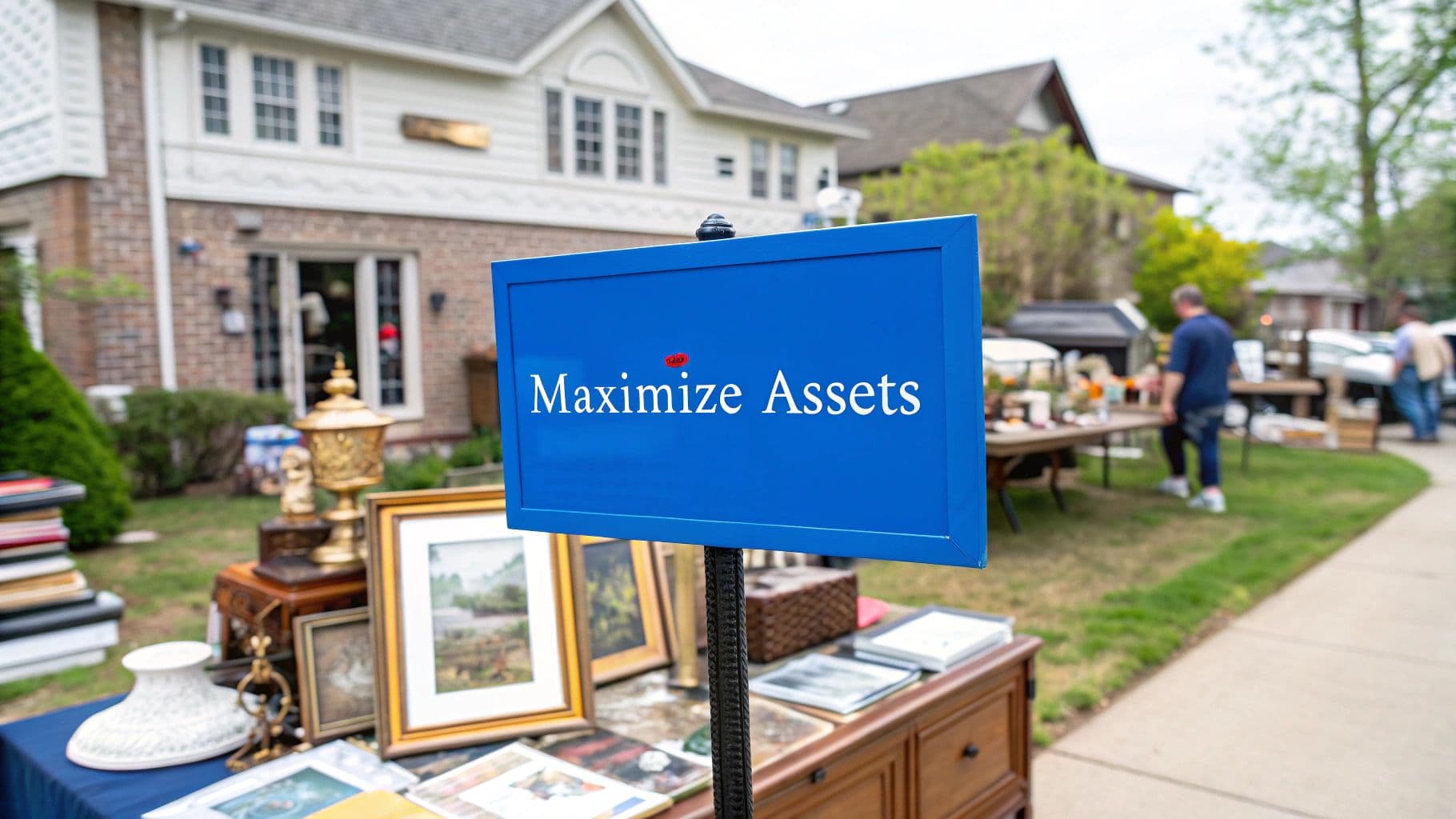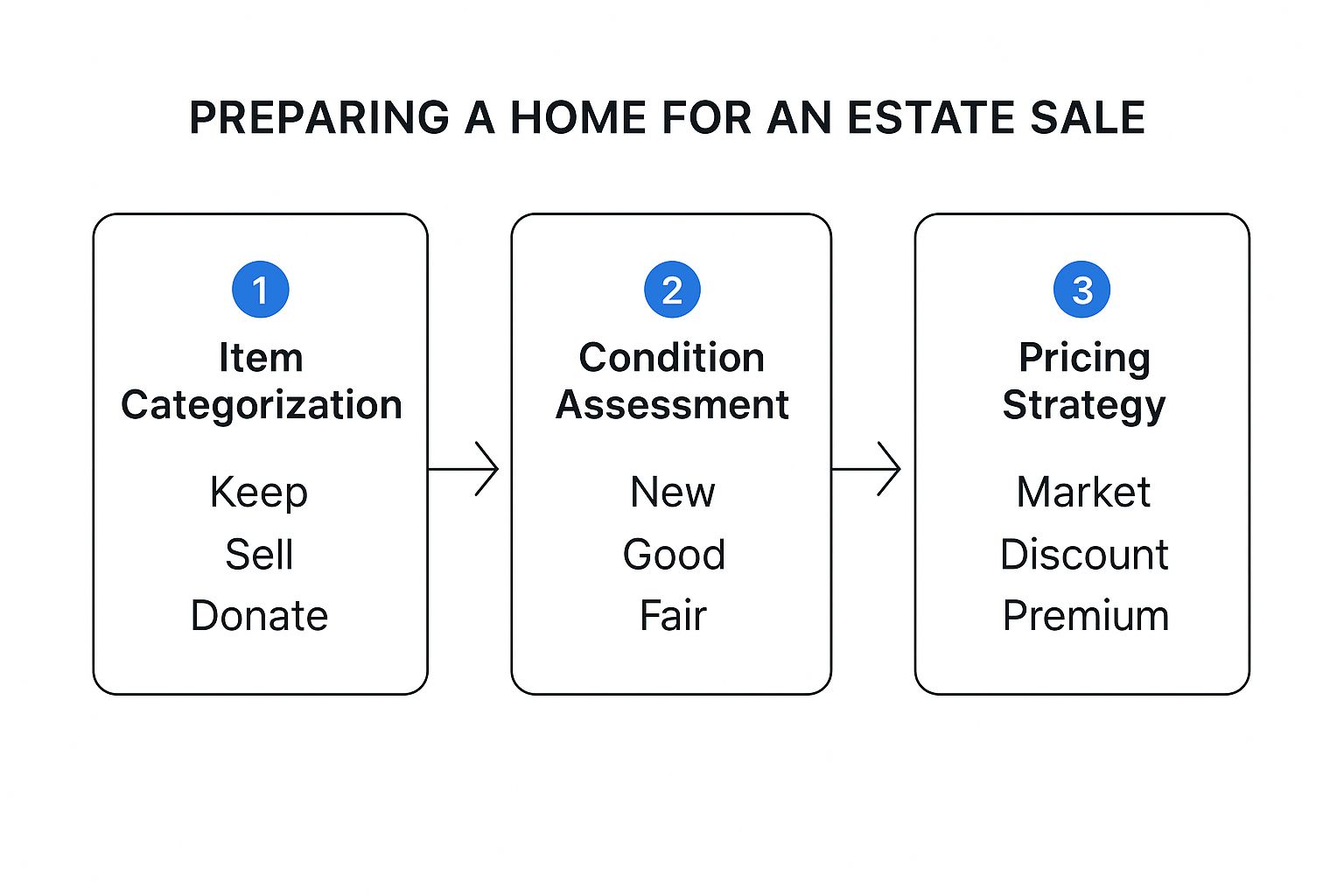Expert Estate Sales and Liquidations Services | Maximize Your Assets

When you're faced with clearing out a home, the sheer volume of "stuff" can feel overwhelming. An estate sale or liquidation offers a structured, dignified way to handle it all. This isn't your average garage sale—it's a comprehensive process for selling nearly everything in a house, usually because of a major life event like a move, downsizing, or settling a loved one's affairs.
Simply put, it’s the most efficient method for clearing out a property while also turning its contents into cash.
Unpacking Estate Sales And Liquidations

Many people hear "estate sale" and immediately picture a weekend yard sale, but that comparison doesn't quite capture the scale or professionalism involved. A yard sale is about getting rid of a few dozen odds and ends.
An estate sale, on the other hand, is like turning a home into a pop-up retail shop for a weekend. Everything from the living room sofa and fine china to everyday kitchen gadgets and clothing is carefully organized, priced, and put up for sale.
This process is almost always born out of necessity. When life changes direction, families are often left with the monumental task of emptying a home filled with a lifetime of memories and possessions. It's a huge logistical puzzle and an emotional journey—one that requires far more than just a sign on the front lawn.
Differentiating Key Terms
While people often use "estate sale" and "liquidation" interchangeably, there's a subtle difference. An estate sale usually focuses on selling items individually to the public over a few days, with the goal of getting fair market value for each piece.
A liquidation often carries a greater sense of urgency. The main objective is to convert all assets to cash quickly. This might involve selling items in bulk to dealers or using faster-paced methods to ensure the property is completely cleared. To get a better handle on the nuances, you can explore our guide on what is estate liquidation.
An estate sale isn’t just about selling things; it's a carefully managed event designed to respectfully and efficiently clear a home while maximizing the financial return for the family or estate owner. It brings order to what can otherwise be a chaotic and emotional time.
Why Are Estate Sales So Common?
The need for estate sales and liquidations is a constant. In the U.S., there are over 15,000 estate sales every week, a number that reflects just how often families face these transitions.
The industry generates more than $1 billion in annual revenue. Statistics show that about 60% of these sales happen after the owner passes away. Another 30% are triggered by downsizing or moves into assisted living facilities, highlighting the major life events that drive the need for this service.
When it comes to dispersing the contents of a home, you have several options. The table below breaks down the most common methods to help you see where an estate sale fits in.
Comparing Home Content Dispersal Methods
| Method | Primary Goal | Typical Pricing | Best For |
|---|---|---|---|
| Estate Sale | Maximize value for all home contents | Individually priced items | Clearing an entire household due to a major life event |
| Auction | Sell quickly via competitive bidding | Set by bidders | High-demand items, antiques, or complete, rapid liquidation |
| Yard Sale | Declutter miscellaneous, unwanted items | Low, negotiable prices | Selling a small volume of low-value personal goods |
| Consignment | Get top dollar for specific, high-value items | Percentage of final sale price | Designer fashion, fine art, or rare collectibles |
Each method has its place, but for clearing a whole house efficiently and profitably, an estate sale or auction is almost always the right tool for the job.
Navigating the Estate Sale Process Step by Step
Tackling an estate sale can feel like a massive undertaking, but it’s really just a series of well-defined steps. When you break it down, the path from a full house to an empty one becomes clear and manageable. Think of it as a project with a beginning, middle, and end, where each phase sets the stage for the next.
It all starts with a simple consultation and inventory. This is your foundation. Whether it's you or a company you've hired, someone needs to walk through the home, room by room, and get a handle on every single item destined for sale. We're talking everything from the antique armoire to the box of old postcards.
This isn’t just about making a list; it's about understanding the entire collection. This first step informs every single decision that comes after, from appraisals to your marketing plan.
Professional Appraisal and Sorting
With a full inventory in hand, it’s time to figure out what everything is worth. While you can probably price everyday dishes and tools on your own, high-value items absolutely need a professional eye. Think fine art, jewelry, rare collectibles, or antique furniture. An accredited appraiser ensures you don’t accidentally let a $5,000 painting go for $50.
Once you have your valuations, the real physical work begins: sorting. This is almost always the most labor-intensive part of estate sales and liquidations. You have to go through every drawer, every closet, and every box to organize the contents.
This is the basic decision-making framework you'll use as you sort.

As you can see, it's a logical flow from categorizing items to checking their condition and then deciding on a price—all crucial for getting the best possible return.
Staging and Strategic Pricing
After everything is sorted, you shift your focus to presentation. Staging is the art of making the home look less like a cluttered house and more like a pop-up boutique. Instead of messy piles, items are displayed thoughtfully on shelves and furniture to help buyers imagine them in their own homes.
Good staging really does three things:
- Improves Visibility: It makes sure every item gets seen, so a valuable vase doesn’t get lost in a corner.
- Creates Flow: It guides shoppers through the home logically, exposing them to everything for sale.
- Enhances Perceived Value: A clean, organized space just makes the items look better and more valuable.
At the same time, you’ll be pricing everything. This is a delicate balance. You want prices high enough to earn what the items are worth but low enough to actually sell. A little online research on what similar items have sold for is a huge help here.
A popular strategy for in-person sales is tiered discounting. For a three-day sale, you might offer full price on Friday, 25% off on Saturday, and 50% off on Sunday. This creates urgency and keeps people coming back.
Marketing and Hosting the Sale
Okay, the house is prepped and priced. Now you need to get the word out. Smart marketing is the difference between a few curious neighbors and a line down the block on opening day. A mix of digital and traditional methods is always the best bet.
- Online Listings: Sites like EstateSales.net or the built-in marketing from a platform like DIYAuctions can reach thousands of dedicated shoppers.
- Social Media: Posting good photos on Facebook Marketplace is a great way to tap into a huge local audience.
- Email Lists: Pro companies and online platforms have a major advantage here—they have huge lists of repeat buyers ready to go.
- Physical Signage: Never underestimate the power of big, clear signs pointing people to your sale!
During the sale itself, your job is to manage the flow of people and transactions smoothly. If you're running an online auction, this means managing bids and coordinating a specific day for everyone to pick up their winnings.
The Final Step: Post-Sale Cleanup
What happens after the sale ends is just as important. It’s almost impossible to sell every single item. The final phase is dealing with what’s left, often called the "clean-out."
You generally have three options for the leftovers:
- Donation: Many local charities will schedule a pickup for the remaining goods, and you’ll get a tax receipt.
- Buyout: Some companies will offer you a single lump sum to purchase everything that's left.
- Disposal: For anything that’s broken or can’t be donated, a junk removal service is the final step.
Once the house is totally empty, a final cleaning leaves it ready for its next chapter. And just like that, you’ve taken a monumental task and seen it through to completion.
How to Maximize Your Financial Returns

Sure, the main point of an estate sale is to clear a home, but let's be honest—the financial outcome is a very close second. Getting the best possible return from estate sales and liquidations isn't about slapping price tags on things and hoping for the best. It takes a smart strategy that involves knowing what things are really worth and creating the right environment for a sale.
Think about it this way: anyone can sell a used couch. But not everyone can spot a mid-century modern designer piece hiding in plain sight that could be worth thousands. This is where a little expertise transforms a basic cleanout into a seriously profitable event.
The Non-Negotiable Role of Professional Appraisals
One of the biggest—and most common—mistakes you can make is underpricing valuable items. For everyday stuff like kitchen gadgets or basic furniture, a quick Google search will get you in the right ballpark. But for anything specialized, a professional appraisal is an investment, not an expense.
Here are the items that almost always need an expert eye:
- Fine Art and Sculptures: An appraiser can identify the artist, confirm it’s authentic, and tell you what it’s worth in today's art market.
- Jewelry and Watches: Precious metals and gemstones need a certified gemologist to assess their quality, carat, and brand significance.
- Antiques and Collectibles: Real antique furniture, rare coins, or vintage comics have specific markers of value that only a specialist can catch.
Skipping an appraisal is like playing the lottery with your assets. You might get lucky, but you’re far more likely to leave a huge amount of money on the table.
Choosing Your Pricing Strategy: Fixed Price vs. Auction Bidding
Once you know the value of your key items, you have to decide how to sell them. Your two main options are fixed pricing and auction-style bidding, and the best choice often depends on the item itself.
Fixed Pricing This is the classic model for in-person estate sales, where everything has a price tag. It’s simple, direct, and works perfectly for common household goods with a known value. Buyers understand it immediately.
Auction-Style Bidding Thanks to online platforms, auction bidding has become a powerful and popular choice. It creates a competitive environment among buyers, which is exactly what you want for unique, rare, or high-demand items. Instead of guessing the perfect price, you let the market decide for you.
A hybrid approach often delivers the best of both worlds. You can use fixed pricing for standard furniture and kitchenware while running an online auction for the art, collectibles, and jewelry. This strategy ensures you get top dollar for your star items while still clearing out everything else efficiently.
Timing and Market Awareness
Believe it or not, when you hold your sale can make a big difference. Scheduling it over a major holiday weekend, for example, could mean fewer shoppers. The broader economic climate also plays a part. For instance, the global real estate market's health often signals how willing people are to buy assets. Strong growth in real estate, including a 21% year-over-year jump in cross-border investments, points to a liquid market where buyers are active.
It also pays to know what's trendy. Is mid-century modern furniture hot right now? Are vinyl records making a comeback? A little research helps you highlight the right things at the right time. For a deeper look at planning your event, check out our guide on how to run an estate sale.
By combining accurate appraisals, smart pricing, and good timing, you can dramatically boost your final profits.
The Rise of Digital Estate Sales
Not long ago, an estate sale meant one thing: a weekend-long event with crowds of people walking through a private home. While that model still has its place, technology has opened up a far more powerful and efficient alternative that's changing the game entirely. The concept is simple but profound: take the entire sale online.
This digital shift moves the whole event from a physical house to a website. Instead of strangers sifting through personal belongings, buyers browse a clean, detailed online catalog from their phone or computer. Right away, this shatters the geographical walls that once limited estate sales and liquidations to just local buyers.
Now, a rare collectible sitting in a small-town home can attract passionate bidders from across the country—or even the world. This much wider audience almost always translates to more competition, which naturally drives up the final prices for the best items.
Embracing the Online Auction Model
At the heart of this evolution is the online auction format. It’s a transparent, effective system where items are listed for a set window, usually 7-10 days, giving interested buyers plenty of time to compete. This creates a dynamic bidding environment that often reveals an item's true market value far more accurately than a simple price tag ever could.
This approach brings huge benefits to both the people selling and the people buying.
- Total Accessibility: Buyers are no longer held back by distance or a restrictive schedule. They can browse and bid 24/7 from absolutely anywhere, which dramatically expands the pool of potential customers.
- Enhanced Safety and Security: An online sale means you don't have hundreds of strangers walking through a private home. This cuts down on the risks of theft, accidental damage, and personal liability.
- Unbeatable Convenience: For sellers, the logistics are so much simpler. Forget managing crowds, handling wads of cash, or staffing a multi-day event. It's all managed through one central dashboard.
The estate sale world is seeing a massive digital shift. Projections show that online auctions and virtual platforms will handle 25-30% of all liquidation deals in key markets by 2025. This move online has also led to more precise appraisals powered by data analytics, helping to boost average sale proceeds by an estimated 12-15% in competitive areas compared to old-school onsite sales. You can dig deeper into these real estate trends and their impacts.
The Power of Modern Platforms
This entire evolution is driven by platforms built specifically for online estate sales and liquidations. These modern tools give everyday people and professionals an all-in-one solution to run their own sales with the same punch as a long-established company.
Platforms like DIYAuctions, for instance, provide a guided workflow that walks you through every single step. Users can quickly build beautiful online catalogs with photos and descriptions, set their auction timeline, and manage all the bidding from one place.
This screenshot from DIYAuctions.com shows just how clean and professional a sale can look, presenting items perfectly to a huge audience. The platform handles the tricky stuff like payment processing and marketing, which frees you up to focus on organizing the items for one easy, scheduled pickup day.
This digital approach truly puts the power back in the hands of families. It delivers the control and financial upside of a DIY sale but with the marketing reach and logistical framework of a professional service.
Ultimately, the rise of digital estate sales gives us a more efficient, profitable, and secure way forward. By moving the "showroom" online, sellers can tap into a global market of eager buyers, making sure every item—from an antique clock to a collection of vinyl records—gets its best shot at finding a new home for a fair price. It's a fundamental improvement to how we handle the complex task of liquidating a home's contents.
Choosing Between Professional Services and a DIY Sale

One of the biggest forks in the road when clearing a home is deciding how to run the sale. It really boils down to one fundamental question: do you hire a full-service professional company, or do you roll up your sleeves and manage it yourself? Each path has its pros and cons, and the right answer completely depends on your situation.
Think of it like hiring a general contractor to remodel your kitchen versus managing the project yourself. The contractor brings in their crew, handles all the headaches, and gets it done—but their expertise and convenience come at a premium. If you manage it yourself, you save a ton of money, but it’s on you to coordinate everything.
The very same logic applies to estate sales and liquidations. Hiring a company is a turnkey solution, while the DIY route gives you complete control and much higher profits. Let’s dig into what each option really means for you.
Evaluating The Professional Route
When you hire a traditional estate sale company, you’re basically handing over the keys and letting the experts take over. They do everything—sorting, pricing, marketing, and running the actual event. This is a fantastic choice for anyone who lives out of state, is short on time, or just feels overwhelmed by the whole process.
The main draw here is convenience. These companies have established systems and a following of regular buyers, which usually leads to a smooth, efficient sale. They know the local market and how to price items to move.
But that convenience comes at a steep price. Most companies operate on commission, typically taking 30% to 50% of the total gross sales from the event. It's so important to understand what those fees mean for your final payout—you can get a full breakdown of typical estate sale commission rates to see just how much it can impact your bottom line.
Understanding The DIY Approach
Going the Do-It-Yourself (DIY) route puts you squarely in the driver's seat. You control every single detail, from what gets sold and for how much to the exact schedule of the event. The most powerful argument for this approach is financial: you keep almost all of the money, which can easily translate to thousands of dollars more in your pocket.
Modern platforms have made this path more accessible than ever. You’re not just sticking a sign in the yard and hoping for the best anymore. Tools like DIYAuctions give you the same marketing power and secure payment processing as a professional service, but with the control and cost savings of a DIY sale.
Of course, the trade-off is your own time and effort. You’ll be the one sorting through belongings, taking photos, and writing descriptions. While the software makes the process a whole lot easier, the physical work still needs to get done.
The decision isn't just about money versus time. It’s also about your comfort level with sales, organization, and logistics. A successful DIY sale requires a hands-on commitment from start to finish.
Making The Right Choice For Your Situation
So, which path is the right one for you? There's no single correct answer. The best way to decide is to weigh the key factors based on your specific needs and resources.
This table breaks down the core differences between hiring a company and managing the process yourself.
| Factor | Professional Estate Sale Company | DIY Approach (with platform support) |
|---|---|---|
| Cost | High commission (30%-50% of gross sales) | Very low fees (often around 10% or less) |
| Time & Effort | Minimal; the company handles almost everything. | High; you are responsible for sorting, cataloging, and setup. |
| Control | Low; you trust the company's process and pricing. | Total; you make all decisions about items, prices, and timing. |
| Expertise | Built-in; you benefit from their experience. | Required; you must research pricing and manage logistics. |
| Net Profit | Lower due to high commission fees. | Significantly higher; you retain most of the revenue. |
In the end, it comes down to this: if you have the time and energy to invest, a DIY sale powered by a modern platform like DIYAuctions will always deliver the best financial return. But if you’re limited by time or distance and just want it handled, a professional service might be the better fit, even with its higher cost.
Common Questions About Estate Sales
Diving into the world of estate sales and liquidations for the first time? You’ve probably got a lot of questions. That’s completely normal. Getting a handle on costs, timelines, and the nitty-gritty details is the best way to feel confident about the process.
Let's clear up some of the most common questions and give you the straightforward answers you need to make smart decisions.
How Much Do Estate Sale Companies Typically Charge?
This is usually the first question on everyone's mind, and for good reason. Nearly all traditional estate sale companies operate on a commission model. They take a percentage of the total sales as payment for handling everything—the sorting, pricing, marketing, and staffing.
That commission usually falls somewhere between 25% and 50%. The final number you’re quoted can shift based on a few things:
- Total Value: An estate packed with high-demand, valuable items will often land a lower commission rate.
- Labor Involved: If the home needs a ton of clean-out, sorting, and organizing, expect the commission to be on the higher end.
- Where You Live: Like most services, rates can differ quite a bit from one region to another.
Always, always get a written contract that spells out the commission and any other potential fees. Some companies add extra charges for things like advertising or post-sale clean-outs, so make sure every last detail is on paper before you sign.
How Long Does The Entire Estate Sale Process Take?
Patience is key here. A well-run estate sale is a marathon, not a sprint. From your first conversation with a company to having a completely empty house, the whole process can take anywhere from a few weeks to a couple of months.
Here’s a rough breakdown of how that time is spent:
- Prep Work (1-3 weeks): This is the heavy lifting. It involves digging through everything, organizing the home for shoppers, researching values, and putting a price tag on every single item.
- Marketing (1-2 weeks): Once everything is ready, you need time to get the word out. Good marketing builds buzz and ensures a crowd of motivated buyers shows up.
- The Actual Sale (2-4 days or 7-10 days): A traditional, in-person sale usually happens over a weekend. An online auction—a popular modern approach for estate sales and liquidations—typically runs for 7 to 10 days to give everyone a chance to bid.
- The Clean-Out (Up to 1 week): After the last buyer leaves, the job isn't quite done. The final step is clearing out whatever didn't sell and getting the property clean.
What Happens To Items That Do Not Sell?
It’s a common myth that every last item will find a new home. The reality is, there will almost always be things left over. Don’t worry, there are solid, time-tested options for what to do next.
The three most common solutions for unsold items are donation, buyout, or disposal. Having a clear plan for this final step ensures the property is fully cleared on schedule, which is often the ultimate goal of the liquidation.
A buyout is where a company offers you a flat fee for everything that’s left—some estate sale companies even provide this service themselves. Donation is another great option; many local charities will schedule a free pickup and give you a tax-deductible receipt. For anything that’s truly junk, disposal via a junk removal service is the final step to an empty house.
Should I Be Present During The Estate Sale?
It’s tempting, I get it. But almost every professional in the business will give you the same advice: please don’t be there. Watching strangers pick through personal belongings and haggle over family treasures is an incredibly emotional and draining experience.
It’s not just about protecting your feelings, either. Your presence can actually hurt the sale. Shoppers might feel awkward or hesitant to browse freely if they know the family is watching them. That can lead to lower sales and a vibe that just feels… off.
The best thing you can do is step back and trust the professionals you hired to do their job. They're trained to be neutral, business-focused, and efficient. Letting them take the lead protects you from a difficult day and allows them to get the best possible results.